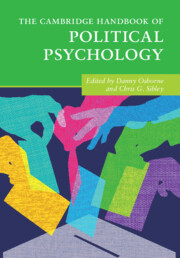Book contents
- The Cambridge Handbook of Political Psychology
- The Cambridge Handbook of Political Psychology
- Copyright page
- Dedication
- Contents
- Figures
- Tables
- Contributors
- Part I Foundations of Political Psychology
- Part II The Politics of Intergroup Attitudes
- Part III Contemporary Challenges to Democracy
- 23 The Political Psychology of Inequality
- 24 How Social Class Influences Political Choices
- 25 Fear and Loathing in American Politics
- 26 Political Extremism
- 27 The Politics of Hate
- 28 Populism
- 29 A Cultural Theory of Autocracy-vs-Democracy
- 30 Psychological Theories Meet the Challenge of Persuading and Mobilising Voters
- 31 Collective Action for Social Change
- 32 Opinion Formation and Polarisation in the News Feed Era
- 33 Conspiracy Theory Belief and Conspiratorial Thinking
- 34 Political Psychology and the Climate Crisis
- 35 The Political Psychology of Cyberterrorism
- 36 Reconciliation in the Aftermath of Collective Violence
- Part IV Diversifying Perspectives in Political Psychology
- Index
- References
31 - Collective Action for Social Change
Individual, Group, and Contextual Factors Shaping Collective Action and Its Outcomes
from Part III - Contemporary Challenges to Democracy
Published online by Cambridge University Press: 17 February 2022
- The Cambridge Handbook of Political Psychology
- The Cambridge Handbook of Political Psychology
- Copyright page
- Dedication
- Contents
- Figures
- Tables
- Contributors
- Part I Foundations of Political Psychology
- Part II The Politics of Intergroup Attitudes
- Part III Contemporary Challenges to Democracy
- 23 The Political Psychology of Inequality
- 24 How Social Class Influences Political Choices
- 25 Fear and Loathing in American Politics
- 26 Political Extremism
- 27 The Politics of Hate
- 28 Populism
- 29 A Cultural Theory of Autocracy-vs-Democracy
- 30 Psychological Theories Meet the Challenge of Persuading and Mobilising Voters
- 31 Collective Action for Social Change
- 32 Opinion Formation and Polarisation in the News Feed Era
- 33 Conspiracy Theory Belief and Conspiratorial Thinking
- 34 Political Psychology and the Climate Crisis
- 35 The Political Psychology of Cyberterrorism
- 36 Reconciliation in the Aftermath of Collective Violence
- Part IV Diversifying Perspectives in Political Psychology
- Index
- References
Summary
Collective action is a pervasive aspect of political life in the 21st century. In the past 20 years, it has also been increasingly studied as a psychologically mediated and consequential form of political behaviour. Initial research focused primarily on the collective organisation of action. This was appropriate: collective action is inherently a group phenomenon. However, this chapter adapts the framework provided by Duncan (2012) to take a broader perspective to examine contemporary scholarship in relation to the individual, group, and contextual factors shaping collective action and its outcomes. We review literature emphasising a key role for individual differences in ideological beliefs and moral conviction, in shaping engagement in collective action. Life experiences such as contact with members of disadvantaged groups, and mobilising interactions (online and offline) have allowed people to co-act across ostensible category boundaries. The depth and breadth of the contemporary literature suggests the need for a broader meta-theory, drawing on the principles of dynamic interactionism, to allow us to more fully articulate what kinds of situations elicit mobilisation potential, and for whom.
- Type
- Chapter
- Information
- The Cambridge Handbook of Political Psychology , pp. 492 - 507Publisher: Cambridge University PressPrint publication year: 2022
References
- 2
- Cited by

